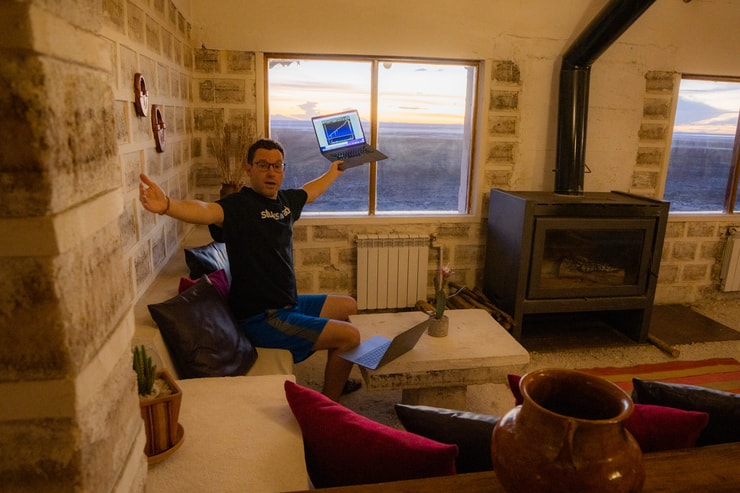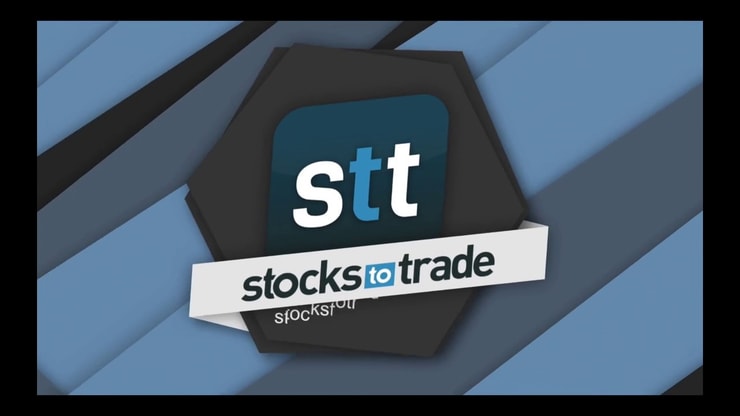The best paper trading platforms let beginners trade with virtual money in real situations, and allow advanced traders to try out new strategies without risking real money. They are connected with trading platforms which let traders make real investments when they’re ready.
Considering the volatility of some of these investments, I encourage a bit of paper trading in the beginning.
I’ve seen stocks spike hundreds of percentage points in one morning. Quick movements like that can be nerve-racking.
It’s essential to practice with a platform that closely mimics the real thing. Otherwise, we’re not practicing … we’re sort of just playing a video game.
I’ve been trading for over 20 years and I have more than $7.6 million in profits. In that time I’ve changed brokers and platforms more than once.
It’s safe to say I’ve got a decently well-rounded view of the available tools.
And there’s no need to break the bank.
Here’s what you need to know …
Table of Contents
- 1 What Is Paper Trading?
- 2 The Best Paper Trading Platforms
- 3 Paper Trading vs. Live Trading. Understanding the Difference
- 4 The Pros and Cons of Paper Trading
- 5 How We Chose the Best Paper Trading Platforms
- 6 Key Takeaways
- 7 Paper Trading Platforms FAQs
- 7.1 Is Paper Trading Risky?
- 7.2 How To Choose the Best Paper Trading App?
- 7.3 Are There Any Risks in Opening a Paper Trade Account?
- 7.4 What Are the Best Day Trading Platforms and Paper Trading Stocks for Beginners?
- 7.5 How Can I Diversify My Investment in Penny Stocks, Index Funds, REITs, and CFDs?
- 7.6 What Are the Deposit and Commission Requirements for a Brokerage Account in Australia?
- 7.7 How Can I Find Reviews and Watchlists of the Best Paper Trading Apps?
- 7.8 What Are the Current Investment Opportunities in Cryptocurrency, Indices, and Bitcoin?
- 7.9 Can You Provide a Guide on How To Open a Bank Account and Select Appropriate Investment Products in the U.S.?
- 7.10 What Are Some Common Investment Terms and Criteria That Anyone Needs To Know Before Starting in the Stock Market?
- 7.11 What Trading Strategies Are Effective for Options Trading?
- 7.12 How Do I Get Involved in U.S. Real Estate Investment, and What Should I Know About Managing an Investment Portfolio?
- 7.13 What Kind of Questions Do Members Commonly Have About Trading Platforms, and Where Can They Find Answers?
- 7.14 How Do You Ensure the Accuracy and Validity of Financial Information Provided on Your Site?
- 7.15 Can You Explain the Concept of Leverage in Trading, and What Are the Associated Risks and Opportunities?
- 7.16 Are There Any Courses, Materials, or Apps That Can Help Beginners Understand Trading Options and Investment Strategies?
- 7.17 Can I Start Trading With Only $1 Million, and What Investment Options Are Available for High Net Worth Individuals in California?
- 7.18 What Technology and Software Do Day Trading Platforms Typically Use, and How Can I Ensure the Security of My Transactions?
- 7.19 I’m Interested in Paper Trading Stocks With Demo Accounts; What Are Some Factors I Should Consider When Choosing a Platform?
- 7.20 How Much Does the Interest Rate Environment in the U.S. Affect the Stock Market, and What Indicators Should I Watch?
What Is Paper Trading?

2025 Millionaire Media, LLCPaper trading allows traders to use virtual money to trade stocks and other assets. It uses accurate quotes to reflect how a trader would have done if they’d been using real money.
It’s about understanding the stock market, making informed trading decisions, learning to read stock charts, and developing your trading strategy. That’s the basic picture.
I help my students through this process in the Challenge.
That’s where all my millionaire students come from.
I showed them my process, the rules I follow, and how to grow as a trader.
And paper trading can play a huge role in every trader’s journey.
Paper trading platforms are like your practice grounds. They enable you to get hands-on experience with trading stocks, options, ETFs, and even cryptocurrencies without risking real money.
It’s the practice you need before you play with fire. It’s about building your trading experience, step by step, without the fear of losses.
Options trading requires a different approach compared to traditional stock trading. The strategies, risks, and rewards can vary significantly.
Having a solid trading plan is essential, and part of that plan includes choosing the right platform. If you’re considering diving into options trading, you’ll find valuable insights in my guide to the best options trading platforms.
Pay attention to the links I drop in this paper. The one above offers a detailed look at various platforms, helping you select the one that aligns with your trading goals.
The Best Paper Trading Platforms

2025 Millionaire Media, LLCPaper trading platforms are where traders of all experience levels come to sharpen their trading skills without risking real money. Let’s explore some of the best ones.
When it comes to real-world trading, the platform you choose can make a significant difference in your success. And there are dozens.
Selecting the right trading platform is essential, whether you’re a day trader or an options trader.
If you’re interested in exploring various platforms tailored to different trading styles, you may find my guide on the best trading platform for day traders helpful. It provides insights into the features and tools that can enhance your trading experience.
No need to bang your head against a pole. Here are some great paper trading choices …
StocksToTrade
StocksToTrade is not your average paper trading platform. It offers a variety of features, including charting and stock screeners, aimed at both beginners and seasoned traders.
There’s a video below that shows StocksToTrade’s platform in more detail …
It’s designed to simulate real market conditions, it’s like a real trading floor minus the risk.
And there’s full broker integration. This means, when your strategy starts paying virtual dollars, it’s easy to switch over and use real money.
I helped design StocksToTrade for small-account traders that want to profit off highly volatile runners.
It has everything you need.
Click here to try a 14-day trial of StocksToTrade for just $7.
Here are some others …
Thinkorswim (Formerly on TD Ameritrade, Now on Schwab)
Thinkorswim offers a robust platform to hone your trading skills. From trading stocks to options and even futures.
Meaning, the platform provides a plethora of tools and resources.
Its PaperMoney feature provides a realistic feel, bridging the gap between simulation and live trading.
More Breaking News
- Rocket Companies Stock Plummets Amid Redfin Acquisition
- Growth or Bubble? Decoding JetBlue’s Stock Surprise
- Will the Momentum of Live Nation Entertainment Inc. Continue?
Interactive Brokers
Interactive Brokers is a name you can trust. With its paper trading accounts, you can experiment with different trading instruments and strategies.
In this manner, it offers access to international markets, equities, bonds, and more, making it a versatile option for those looking to explore.
Webull
Webull’s paper trading platform caters to both beginners and experts. With a user-friendly app and a wealth of information, it provides a learning curve without the steep falls.
A user can build fake portfolios on exchanges to get a sense of the finance world.
Its platform is available on iOS and Android, offering a mobile experience that reflects today’s trading world. The mobile aspect makes Webull less effort to use.
eToro
eToro’s approach to paper trading is social and engaging.
You can simulate trades, and follow experienced investors and traders. You can even practice with cryptocurrencies. It’s a global platform, offering a diverse range of trading experiences.
TradeStation
TradeStation isn’t just another name on the list; it’s a place for serious practice.
Its simulator mirrors real-time market data, offers extensive tools, and gives you the momentum you need to proceed from practice to profits.
Also, ask your friends which platform they use and why. Maybe ask if they had to buy it. It could help give you ideas if you’re in a situation to choose.
Paper Trading vs. Live Trading. Understanding the Difference

2025 Millionaire Media, LLCPaper trading is your training ground; live trading is the battlefield. The object might be the same, but the stakes are different.
Paper trading platforms like Webull and Thinkorswim allow you to test strategies without risk. It’s one of the steps to building knowledge, refining skills, and understanding market conditions.
Sometimes paper trading feels like a breeze. But live trading is the real deal.
The risks, the highs, the lows — they’re not simulations. The strategies you tested, and the skills you honed, all come into play here.
For a lot of people, the switch to live trading feels like the difference between the colors of black and white.
It’s about taking those practice positions and turning them into real profits or learning from real losses.
The Pros and Cons of Paper Trading
Paper trading offers a low-risk entry into the world of trading.
In most cases, it allows for practice, learning, and refining strategies. You can trade stocks, options, ETFs, and other items without the fear of losing real money. It’s a practice field with real value.
It’s a great idea, but it’s not perfect. Paper trading can’t replicate the emotions of real trading.
The fear, the excitement, the adrenaline – they aren’t part of the simulation. That’s a gap only live trading can fill.
Understand the differences, and you’re one step closer to being a successful trader.
How We Chose the Best Paper Trading Platforms

2025 Millionaire Media, LLCChoosing the best paper trading platforms isn’t a matter of personal bias.
It’s about evaluating features, accessibility, offerings, and more. We’ve considered platforms like:
- StocksToTrade
- Robinhood
- Acorns
- Thinkorswim
- Tradier
We’ve reviewed the tools, the charting capabilities, the support for different trading instruments, and the accessibility across devices.
I’m not the author of any books on paper trading, but I like to think over 20 years of trading experience gives me enough authority.
We chose based on quality, experience, and user feedback. We dug into the details to find the platforms that offer the most to you, the trader looking to grow without unnecessary risks.
In addition to paper trading platforms, having access to a reliable stock trading app can significantly enhance your trading experience. The convenience and functionality of trading on the go can be a valuable asset for both beginners and experienced traders.
If you’re looking for a versatile and user-friendly app to complement your trading strategy, you might find my review of the best stock trading app helpful. It explores various apps, focusing on their unique features and benefits, to assist you in finding the perfect fit for your trading needs.
Key Takeaways

2025 Millionaire Media, LLCPaper trading is not just a game; it’s a crucial step in building your trading skills.
The right platform can make or break your learning experience.
Real trading is different and transitioning requires understanding those differences.
Trading isn’t rocket science. It’s a skill you build and work on like any other. Trading has changed my life, and I think this way of life should be open to more people…
I’ve built my Trading Challenge to pass on the things I had to learn for myself. It’s the kind of community that I wish I had when I was starting out.
We don’t accept everyone. If you’re up for the challenge — I want to hear from you.
Apply to the Trading Challenge here.
Trading is a battlefield. The more knowledge you have, the better prepared you’ll be.
Have you ever paper traded before? What platform did you use? Let me know in the comments — I love hearing from my readers!
Paper Trading Platforms FAQs
Is Paper Trading Risky?
Paper trading isn’t about financial risk; it’s about learning.
It’s a safe environment where you can experiment with trading stocks, options, and other instruments without financial losses. But it’s essential to treat it with the same seriousness as live trading to gain real benefits.
How To Choose the Best Paper Trading App?
Choosing the best paper trading app isn’t just about the shiny features.
Look for platforms that offer a realistic experience, align with your trading strategy, provide access to the trading instruments you’re interested in, and offer support and resources to grow your skills.
Are There Any Risks in Opening a Paper Trade Account?
Opening a paper trading account is generally risk-free. It’s a simulator, a practice ground.
But make sure to choose a reputable platform like Webull, Thinkorswim, or Interactive Brokers to ensure quality and reliability.
What Are the Best Day Trading Platforms and Paper Trading Stocks for Beginners?
Several platforms are recommended for beginners, including Fidelity and stock market simulators that offer paper trading stocks.
These platforms provide user-friendly desktop software, various order types, and often include games for practicing trading skills.
How Can I Diversify My Investment in Penny Stocks, Index Funds, REITs, and CFDs?
Investing in different asset classes like penny stocks, index funds, REITs, and CFDs requires understanding their underlying market regulations in the U.S. or U.K. and leveraging available brokerages with expertise in these fields.
What Are the Deposit and Commission Requirements for a Brokerage Account in Australia?
Most Australian brokerages have varying deposit requirements ranging from $1 million for institutional investors to minimal amounts for individual savings accounts.
Commission structures also differ, and it’s essential to review the ASIC regulations for transparency.
How Can I Find Reviews and Watchlists of the Best Paper Trading Apps?
You can search online sites or YouTube channels specializing in investment and trading reviews.
These platforms often provide watchlists, price comparisons, trial offers, and user communication forums to evaluate the best paper trading apps.
What Are the Current Investment Opportunities in Cryptocurrency, Indices, and Bitcoin?
Investing in cryptocurrency, indices, and Bitcoin offers diverse opportunities but also comes with unique regulations and risks, especially in countries like the U.K. and Australia.
It’s essential to follow the latest news, market trends, and consult with financial advisors to understand potential gains and downsides.
Can You Provide a Guide on How To Open a Bank Account and Select Appropriate Investment Products in the U.S.?
Sure, opening a bank account in the U.S. involves specific regulations, including providing identification codes and proof of placement (residency).
For investment products, consult your local brokerage, review available funds, deposits, IRA options, and assess the compensation and guarantees provided.
In the history of the U.S., it’s long been a place where determined people have an opportunity to rise to the top. Whether they’re immigrants escaping civil war from behind enemy lines, or someone moving from a third-world country, the stock market can provide real profit opportunities.
What Are Some Common Investment Terms and Criteria That Anyone Needs To Know Before Starting in the Stock Market?
Some common investment terms include leverage, spreads, commission, interest rates, and IPOs. Anyone interested in the stock market should understand the criteria
What Trading Strategies Are Effective for Options Trading?
Various trading strategies can be employed in options trading. Some common methods include covered calls, iron condors, and straddles.
It’s essential to understand the underlying stock’s statistics, price movements, and market indicators to execute these strategies effectively.
How Do I Get Involved in U.S. Real Estate Investment, and What Should I Know About Managing an Investment Portfolio?
Investing in U.S. real estate requires a clear understanding of the market, local regulations, and the desired property type (e.g., commercial, residential).
Managing an investment portfolio involves diversification, regular reviews, and aligning investments with your financial goals, risk tolerance, and investment strategies.
Ask your broker for professional input.
What Kind of Questions Do Members Commonly Have About Trading Platforms, and Where Can They Find Answers?
Members often ask questions about platform functionality, fees, supported trading options, demo accounts, and technology requirements.
Answers can typically be found in the platform’s FAQ section, support articles, community forums, or by contacting customer service members.
How Do You Ensure the Accuracy and Validity of Financial Information Provided on Your Site?
We strive to maintain accuracy through rigorous fact-checking, adherence to regulations and protocols, regular updates, and transparency in our disclaimer.
Our content partners and advertisers are also committed to maintaining high standards, and we welcome feedback and corrections from our readers.
Can You Explain the Concept of Leverage in Trading, and What Are the Associated Risks and Opportunities?
Leverage in trading allows traders to control a larger position with a smaller amount of money.
It’s like if you only had one apple to trade for barley but then you borrowed a bunch more apples. You can use whichever units you like; apples, barley, money. Leverage us like borrowing money.
It amplifies both gains and losses, making it a double-edged sword. Understanding the leverage ratio, the effect it has on potential returns, and the associated risk management strategies (such as stop-loss orders) is crucial.
Are There Any Courses, Materials, or Apps That Can Help Beginners Understand Trading Options and Investment Strategies?
Yes, many online platforms and brokerages offer courses, tutorials, articles, and apps that cover trading options and various investment strategies.
Topics range from basic terminology to advanced techniques. Look for courses that include real-life examples, practice demo accounts, and interactive elements to enhance understanding.
Can I Start Trading With Only $1 Million, and What Investment Options Are Available for High Net Worth Individuals in California?
With $1 million, you have access to a wide array of investment options, including stocks, bonds, real estate, private equity, and more.
Instead of swiping the credit card, open a trading account.
In California, specific opportunities may also include technology startups, green energy projects, and local real estate developments. Working with a financial advisor familiar with the California market is recommended.
What Technology and Software Do Day Trading Platforms Typically Use, and How Can I Ensure the Security of My Transactions?
Day trading platforms typically leverage advanced technology, including real-time market data feeds, statistical analysis tools, and secure transaction protocols.
Ensuring security involves using strong passwords, two-factor authentication, keeping software up to date, and following the platform’s security recommendations.
I’m Interested in Paper Trading Stocks With Demo Accounts; What Are Some Factors I Should Consider When Choosing a Platform?
When selecting a platform for paper trading stocks with demo accounts, consider …
- the available trading options
- user interface
- technology compatibility
- real-time market data accuracy
- available investment and trade strategies
- community support
Reviews and recommendations from experienced users can also guide your choice.
How Much Does the Interest Rate Environment in the U.S. Affect the Stock Market, and What Indicators Should I Watch?
Interest rates in the U.S. have a significant effect on borrowing costs, consumer spending, and overall economic activity.
Changes in interest rates can influence stock prices, sectors like real estate, and the broader market.
Key indicators to watch include the Federal Reserve’s policy announcements, inflation statistics, and economic growth data.





Leave a reply